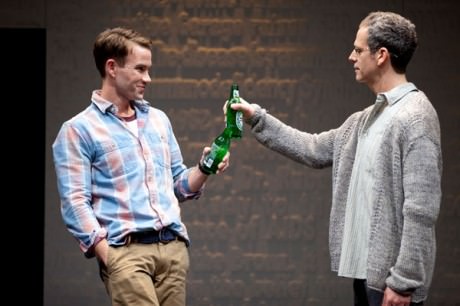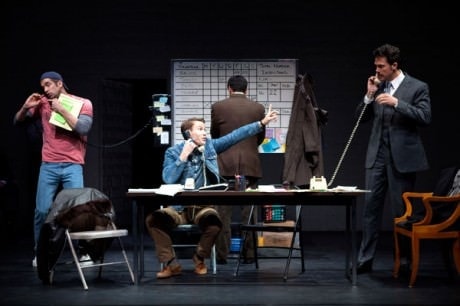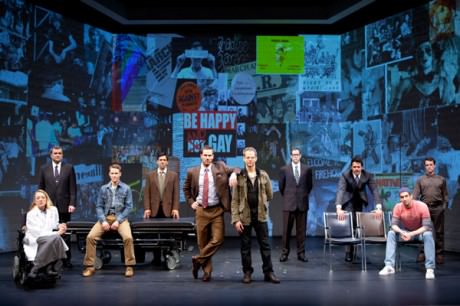Christopher J. Hanke is a member of the outstanding ensemble of Larry Kramer’s The Normal Heart, now playing at Arena Stage. I asked Christopher to talk about his role and working with his fellow actors in this very emotional production.

Joel: How did you get involved in this production of The Normal Heart?
Christopher: I saw The Normal Heart on Broadway this past summer and it pierced me deeply. In every way. I knew, one day, I wanted to be involved in this production. When my good friend Luke MacFarlane signed on to do the play again but this time in DC, I knew I had to play Tommy Boatwright.
I live in LA and couldn’t get to NYC to meet with our GENIUS director George C. Wolfe so I took my trusty flipcam and basically made a video of me begging him to cast me in this play. And it worked! My agents sent it to his peeps and next thing I know, I woke up in DC with my life secretly changed by this play and a better man for it!
Introduce us to the character you play and tell us what personal experiences helped you shape your performance?
I play Tommy Boatwright. Hospital Administrator by day. Southern bitch by night. And I’m serious! Tommy is one of those special beings that can handle crisis, caretake, hold, nurture, but when needed, launch a one liner zinger to diffuse attention or break the ice.
He’s been a dream to discover. I love how Tommy grows up in this play. He has to! Everyone around him is behaving like children and Tommy steps forward to become one of the young GMHC leaders. For me personally, I’ve volunteered tons of hours in hospitals so I know what that is like, and I’m from the South, so I know what the southern bitch thing is too!
Have you met Larry Kramer and has he been involved in this production? What do you admire most about him and the script?
Yes Larry was with us the very first day in New York when we read the play. I will never forget seeing him bow his head during the read-thru and wipe away tears–after all this time this play still resonates with him. There is an old saying in my field, “if you don’t believe it, then they won’t believe it!”, and Larry epitomizes that. His bravery and courage are qualities I aspire to strengthen in my life. I could also borrow some of his wit. Yeah, his wit!
You were a young child this play takes place. What have you learned from this play that you didn’t know before about this horrible time?
Oh lord, have I ever! This has been a master class in gay culture, gay politics, American history–all of it–in this play alone and also in the materials I researched in prepping for this journey. I didn’t realize how ignored this social group was when this virus popped up; how the government, city, and health groups did almost nothing to lend a hand or help in combat. It’s embarrassing actually. But it’s our history. And I hope we continue to learn from it.
I saw this production last week and I was so emotionally drained that I couldn’t leave the theatre right away. How hard is it for you to perform this show day after day? And was has been most rewarding for you appearing in this production?
The play is very difficult to navigate emotionally day in and day out. That’s where the vodka comes in! I joke but not without some truth. Sometimes we are so drained post show that you want to do a 180 and go have margaritas and music with the cast. We are all a very supportive group and close-knit and are there for each other when needed.

What scenes are the most difficult and exhilarating for you to perform and watch others perform in the show, and how did Director George C. Wolfe help you with these scenes?
For me, the phone bank scene is the most difficult because it is the most technical. I bet Michael says this scene as well – but for different reasons. There are so many different phones, with different rings, and the dialogue is overlapping and quick-paced that you have to mentally really focus. There are laughs in the scene as well plus utter anger and emotional devastation so you also have to be listening to each other and the audience so you know how to perfectly navigate the storytelling. And George made us run this scene a thousand times and even makes us run this scene every single day at intermission to keep us on it!
What have you learned about yourself as an actor while performing in The Normal Heart, and what have you learned watching your fellow actors perform in this show?
Our director told me on opening night that he thought I had grown a lot during this production. I immediately assumed he was meaning as an actor, and I thanked him and referenced something actory like “…finding the character;” but he corrected me and said, no, I mean as a man, you’ve grown up from more of a child to more of a man. And he’s right. I didn’t realize this but it’s true. Maybe it’s the fact this is one of the first shows I’m doing with all adults, maybe it’s Larry’s play, I dunno…but I like it. I really like it.
You just ended a run as Bud Frump in the revival of How to Succeed.. . What was the most fun you had doing that show? Is there a little Bud Frump in Tommy, who you play here?
How to Succeed… was a big, fat, ball of fun! I loved finding all the physical comedy in Bud Frump. I always enjoy the discoveries in characters. But carving out the Jerry Lewis, Dick Van Dyke, Jack Lemmon moments in him were the meat for me. I always pull from the old school greats – despite my age. For those Harry Potter fans, you will be happy to know Daniel Radcliffe was an absolute dream to work with. I’d say there is not much Bud Frump in my Tommy. These guys aren’t even in the same world much less family tree.
What advice do you have for a student who is considering making theatre his/her career?
Be happy early on that you will be broke most of your life but that you will be content with that knowing you are doing what you love.
What’s next for you after this run at Arena Stage?
I’m going to upstate NY to my house I just bought and spent a year renovating and going to relax and read and regroup for fall back in LA.
Why is it important for DC theatregoers to come and see The Normal Heart, and what do you want audiences to take with them after leaving The Kreeger?
This is a huge part of our American history – that’s why you should see this play. Doesn’t matter about your age, sex, gender, political views or sexuality: you will learn so much from this play. The Normal Heart highlights this civil rights movement in a gorgeous, emotional story that teaches you so much about the evolution of this fight. And It’s not over. But we need to know how we got here to this moment – we all do – and this play does that. It is an important political, historical play that teaches, empowers, and hopefully, convicts us to stand up and fight for the marginalized.

The Normal Heart plays through July 29, 2012, at Arena Stage at The Mead Center for American Theater, in The Kreeger Theater – 1101 Sixth Street, SW, in Washington, DC. For tickets, call (202) 488-3300, or purchase them online.
LINKS
My interview with Michael Berresse, who is playing Mickey Marcus in The Normal Heart.
Alex Murphy’s review of The Normal Heart on DC Theater Arts.




